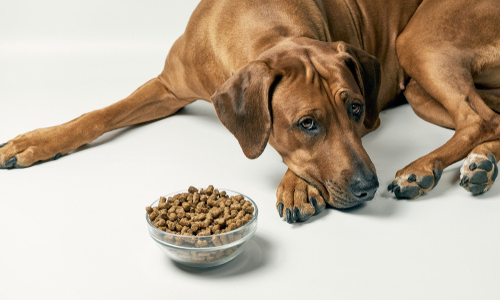
Common Digestive Issues Your Dog May Experience
Diarrhea, constipation, vomiting, and other digestive problems can make your dog one unhappy pooch. Identifying the cause of your pet's problem is the first step in helping your pet feel better.
These Digestive Problems May Affect Your Dog
You probably wouldn't be surprised to learn that digestive issues are a frequent reason for veterinary visits. Given their interest in eating anything that remotely resembles food, it's only natural that dogs might develop a digestive problem or two.
Five digestive issues are most common in dogs, according to researchers at Cairo University. They include vomiting, diarrhea, vomiting and diarrhea together, lack of appetite, and constipation.
Common Causes of Digestive Problems
The most common reasons dogs develop digestive symptoms are:
Food Allergies
A food allergy could be to blame if your dog is vomiting and has diarrhea. Food allergy symptoms may also include skin infections or itchy ears or eyes. Chicken, beef, dairy, and eggs are the most common food allergens for dogs, according to the Cummings Veterinary Medical Center at Tufts University.
Remedy: Your veterinarian may recommend an elimination diet if he or she suspects a food allergy. During the diet, you'll feed your dog a type of food that it's never had before, then gradually add back the foods that might be causing the allergies. If one type of food is the culprit, your pet will develop the symptoms again. Once you've identified the allergen, you can change your pet's diet.
Eating an Off-Limits Food or Object
Chocolate, caffeine, grapes, raisins, onions, nuts, coconut, yeast doughs, household cleaners, and other products can cause digestive issues or make your pet dangerously ill.
Remedy. Call your veterinarian if you suspect that your dog ate something it shouldn't have. If your dog overindulged in a harmless snack from the trash can, chances are it will feel better once the food passes through its digestive tract. Get in touch with the vet immediately if you're not sure what your pet ate, if you don't know if the food is harmful, or if your pet vomits, has frequent diarrhea, struggles to breathe, coughs, gags or shakes.
Stress
Stress disrupts your pet's sensitive digestive system and may be a factor in diarrhea. Any change in your dog's environment could trigger stress, from your son heading off to college, to the introduction of a new pet, or even separation anxiety.
Remedy. Treating stress-related diarrhea involves identifying the stressor and making a few changes in your pet's life. The pressure of a Thundershirt or calming coat may help reduce stress and anxiety. Other options include anti-anxiety medication, slowly desensitizing your pet to the stressor, behavior therapy, or increased socialization.
Lack of Fiber
Foods that contain fiber, such as oats, bran, and rice, moisten stools and help them pass through your pet's large intestine easily. If your dog's food doesn't contain enough fiber, constipation may become a problem.
Remedy. Choosing a pet food with a higher fiber content may be a simple solution if your dog's constipation is related to a lack of fiber.
Dietary Changes
It can take a while for your dog to get used to a new type of food. Until then, your pet is more likely to experience diarrhea or constipation, or even avoid eating if it doesn't like the new food.
Remedy. A gradual introduction of any type of new food will help prevent diarrhea or constipation. Continuing digestive problems may mean that the food isn't a good choice for your pet.
Illnesses and Diseases
Infections, illnesses, diseases, worms, obstructions, and tumors can also be responsible for vomiting, diarrhea, constipation, or lack of interest in food.
Remedy. Since it's often difficult to tell why your dog is experiencing digestive problems, it's important to visit the veterinarian if symptoms continue longer than a day or two. If digestive issues are caused by an underlying health problem, treating the problem may ease your pet's discomfort.
Give us a call right away if you notice any changes in your dog's digestive health. Prompt treatment will help your dog recover more quickly and reduce the risk of complications if your dog has a serious disease or condition.
Sources:
American Kennel Club: Understanding, Preventing, and Treating Dog Anxiety, 1/15/21
Merck Veterinary Manual: Introduction to Digestive Disorders of Dogs, 5/18
American Kennel Club: A Survival Guide for Dog Diarrhea, 9/17/20
